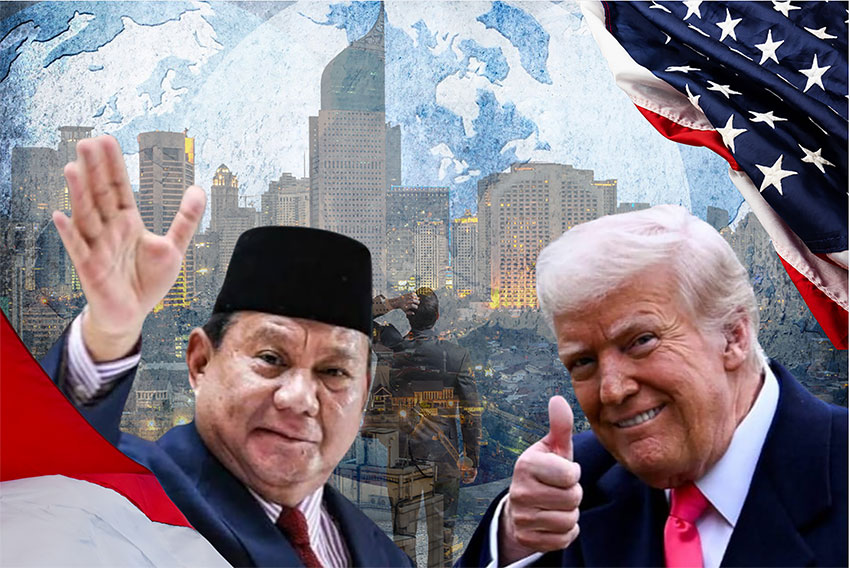The Geopolitical Turmoil of the United States and the Path of Stability Toward Indonesia Raya

Today’s world is no longer merely a stretch of maps marked by national borders. It is an intricate web of destinies, interests, and streams of power that transcend geography. The United States, with its might as a global superpower, stands at the center of that current. Every foreign policy decision, every domestic political upheaval, and every military maneuver reverberates across Asia, Africa, and even into our own homeland.
Therefore, when we speak of “navigating the geopolitical turmoil of the United States and its impact on domestic stability,” we are, in truth, discussing how Indonesia can stand firm as a resilient nation — one that does not easily falter amid global storms and continues to stride toward the vision of Indonesia Raya.
At present, the United States itself is caught in an increasingly complex geopolitical vortex. Rivalry with China has intensified, tensions in the Middle East remain unresolved, and the war in Ukraine continues as an unhealed wound. These are not merely ideological battles or contests for influence; they have tangible effects on energy prices, global supply chains, and the stability of world financial markets.
Though separated from us by thousands of miles, America remains a gravitational center that moves the pulse of the global economy. When the Federal Reserve raises interest rates, global capital flows shift. When Washington imposes sanctions on Russia or Iran, oil prices surge. When political tensions rise within the U.S. Congress, world financial markets tremble in response.
Indonesia cannot pretend to stand outside this vortex. As an emerging nation deeply integrated into global trade and capital flows, every upheaval in the U.S. quickly seeps into our domestic sphere. The rupiah weakens, food prices rise, energy costs swell, and social stability is threatened. This is the great challenge: how to maintain internal calm amid a turbulent world — without losing direction in pursuing our national ideals.
Stability, therefore, is not a static condition but a dynamic process. It is not solely an economic issue but also a political, social, and cultural one. The geopolitical turmoil of the United States teaches us that true domestic stability must rest on firm foundations, not short-term reactions. First, a sovereign economic foundation: strengthening food, energy, and basic industrial resilience to withstand global fluctuations. Second, a solid political foundation: avoiding elite fragmentation and popular polarization that erode national endurance. And third, a unifying socio-cultural foundation: national unity, as mandated by Pancasila, remains our primary capital in facing external pressures.
For Indonesia, this means that economic policy cannot stop at impressive macro numbers on paper. True stability exists when food prices are affordable, when children can attend school without anxiety, and when citizens feel safe from uncertainty. In confronting global shocks, the state must prioritize the protection of ordinary people — not merely the interests of the market.
The geopolitics of the United States also reveals that the world has entered a multipolar era. Single hegemony is being challenged; new powers are rising, and old alliances are fracturing. For Indonesia, this is not merely a threat but an opportunity. As a strategically positioned nation in the Indo-Pacific, Indonesia can serve as a balancer, a bridge, and even a new center of gravity. But to fulfill that role, domestic stability is an absolute prerequisite. No nation can play a global role if its own house is fragile.
The path toward Indonesia Raya means building steadfast sovereignty — not succumbing to geopolitical pressures, yet not isolating ourselves either. We must practice flexible diplomacy, maintaining good relations with all major powers while consistently upholding national interests as our guiding compass. President Prabowo Subianto has emphasized an independent and active foreign policy, coupled with a strong national defense, so that Indonesia cannot be easily swayed by external pressures.
There is a core value that must never be forgotten: self-reliance. The geopolitical upheavals of the United States remind us that any nation overly dependent on external powers will remain vulnerable. Indonesia must dare to build economic independence, strengthen its defense, and affirm its national identity. Self-reliance does not mean isolation; it is the ability to stand tall among nations without losing one’s identity.
The road to Indonesia Raya is long and full of waves. The geopolitical turmoil of the U.S. is but one storm among many to come. Yet if this nation can preserve domestic stability, strengthen unity, and uphold self-reliance, then every storm will serve not to destroy us, but to fortify us.
The greatest lesson to be learned is this: domestic stability is both the final fortress and the first foundation. Without it, the vision of Indonesia Raya is a mirage. With it, every global tempest can be faced. The United States, for all its might, remains vulnerable amid geopolitical turbulence. Indonesia, with all its limitations, can discover its strength if it can preserve harmony within.
Like a ship sailing across a vast ocean, we cannot control the direction of the wind — but we can set our sails. The geopolitical storms from the United States are strong winds: they can either batter us or propel us forward toward our destination. It all depends on the wisdom with which we set our sails, maintain our balance, and stay true to our national compass. That compass is called Pancasila — guiding us not only toward stability but toward greatness: a truly Indonesia Raya.
Prof. Dr. Ermaya Suradinata, SH, MH, MS Director General of Social and Political Affairs, Ministry of Home Affairs of the Republic of Indonesia (1999–2001), Governor of the National Resilience Institute (LEMHANNAS) of the Republic of Indonesia (2001–2005)
